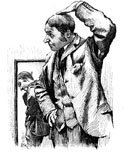
Unintelligible Profundities & Intelligible Muddles
WHY DO 'THE BEST & THE BRIGHTEST' FALL FOR THEM?
One of our most respected moralists, Alasdair MacIntyre, has lamented that there is “no rational way of securing moral agreement in our culture.” Why this moral breakdown?
One place to look for the answer is in the books of the more fashionable philosophers of the 20th century, men whose names are dropped with pride and whose sayings are quoted with respect in our institutions of higher learning, including some institutions of the Catholic persuasion.
Granted, the modern philosopher’s lot is not a happy one. Alfred North Whitehead once said that Western philosophy is all footnotes to Plato. An exaggeration, but true to this extent: Many of the interesting things were written long ago. In recent times there has been less and less room for originality.
Faced with this dilemma, many philosophers, starting about the time of Hegel in the early 19th century, have resorted to what A.O. Lovejoy calls “unintelligible profundity.” I have been working on a book that involves the intellectual history of the idea of justice, which has compelled me to read some of today’s fashionable philosophers, writers such as the German Martin Heidegger, the Frenchmen Jean-Paul Sartre and Jacques Derrida, and the Lithuanian-Frenchman Emmanuel Levinas.
You May Also Enjoy
Enlightenment philosophers undermined religion but failed to provide a workable substitute, and the void they created continues.
The hallmark of Catholic theology is that it insists on the concrete and resists the ethereal. Our beliefs are beliefs about reality.
Debate, dialogue, discuss, argue, or even shout, as your personal taste in such matters dictates. But schism is never the answer.

